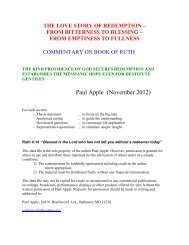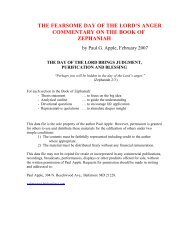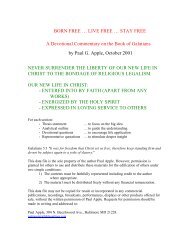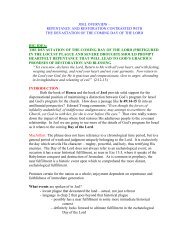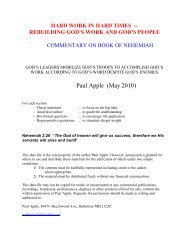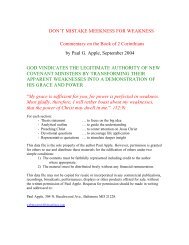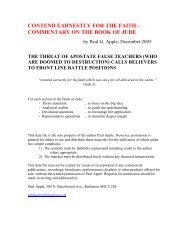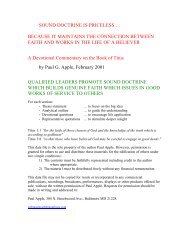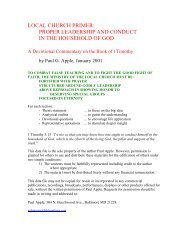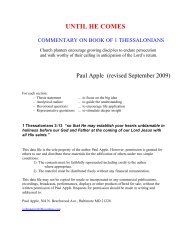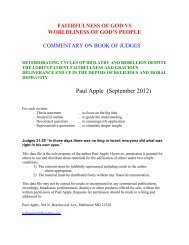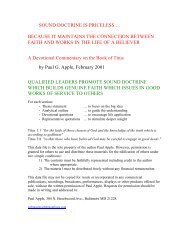in wrath remember mercy . . . the just shall live by faith - Free sermon ...
in wrath remember mercy . . . the just shall live by faith - Free sermon ...
in wrath remember mercy . . . the just shall live by faith - Free sermon ...
Create successful ePaper yourself
Turn your PDF publications into a flip-book with our unique Google optimized e-Paper software.
3. Second Problem of <strong>the</strong> Prophet (greater than <strong>the</strong> first), 1:12-17Why would God permit His people to be punished <strong>by</strong> a nationmore wicked than <strong>the</strong>y? Why did He not destroy <strong>the</strong> Chaldeans?II. PERCEPTION of <strong>the</strong> Prophet (Chap. 2)1. Practice of <strong>the</strong> Prophet, 2:1He took <strong>the</strong> secret problem to <strong>the</strong> secret place.2. Patience of <strong>the</strong> Prophet, 2:2,3He waited for <strong>the</strong> vision.3. Pageant for <strong>the</strong> Prophet, 2:4The great divide <strong>in</strong> humanity: One group, which is crooked, is flow<strong>in</strong>gtoward destruction; <strong>the</strong> o<strong>the</strong>r group, <strong>by</strong> <strong>faith</strong>, is mov<strong>in</strong>g toward God. Thisis <strong>in</strong>evitable.4. Parable to <strong>the</strong> Prophet, 2:5-20The application is self-evident from <strong>the</strong> vision. The Chaldeans, <strong>in</strong> turn,would be destroyed. God was mov<strong>in</strong>g among <strong>the</strong> nations.III. PLEASURE of <strong>the</strong> Prophet (Chap. 3)1. Prayer of <strong>the</strong> Prophet, 3:1,2The prophet, who thought God was do<strong>in</strong>g noth<strong>in</strong>g about evil, now asksHim to <strong>remember</strong> to be merciful. Was he afraid that God was do<strong>in</strong>g toomuch?2. Program of God, 3:3-17God rides majestically <strong>in</strong> His own chariot of salvation (v.8)3. Position of <strong>the</strong> Prophet, 3:18-19He will rejoice (v. 18). He has come from pa<strong>in</strong> to pleasure.McGee:In <strong>the</strong> book of Judges <strong>the</strong>re is put down a great pr<strong>in</strong>ciple of government, a pr<strong>in</strong>ciplewhich is also stated very clearly <strong>in</strong> <strong>the</strong> prophecy of Isaiah. All of <strong>the</strong> subsequent prophetssimply bear out and apply this pr<strong>in</strong>ciple which has already been stated. The pr<strong>in</strong>ciple isthis: There are three steps <strong>in</strong> <strong>the</strong> downfall of a nation. First of all, <strong>the</strong>re is religiousapostasy. The second step is moral awfulness. And <strong>the</strong> third step is political anarchy.These are <strong>the</strong> three steps <strong>by</strong> which nations pass off <strong>the</strong> stage of human history. That hasalways been <strong>the</strong> way that it has moved. You see, <strong>the</strong> primary problem never was politicalanarchy. The primary problem never was moral awfulness. As bad as <strong>the</strong>se are, <strong>the</strong> rootproblem goes back to religious or spiritual apostasy, a turn<strong>in</strong>g away from <strong>the</strong> liv<strong>in</strong>g andtrue God.<strong>Free</strong>man: The style of Habakkuk is unique. Instead of address<strong>in</strong>g <strong>the</strong> people directly as<strong>the</strong> Lord’s spokesman, Habakkuk imparts his message as a dialogue between himself and



